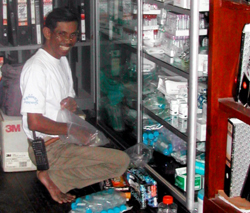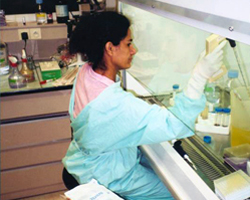
From its inception, the GHC/CHC team has recognized the obligation to link research with delivery of care. Discovery is an integral component of GHC's misson. That is, in the context of these terrible epidemics, it is imperative to learn lessons that can be harnessed for future therapies. This is accomplished by bridging the vast scientific resources of, for example, Harvard Medical School, to the poorest regions of Cambodia. This approach has led to the discovery of the first gene associated with susceptibility to TB and the discovery of a novel group of T cells that inhibit appropriate immune responses in certain TB patients and which play a role in AIDS as well.
In addition to providing treatment to patients living with TB and HIV/AIDS today, the GHC is trying to understand how to improve treatment and cure, and has set up an infrastructure to evaluate new therapies and vaccines as they become available. By working to develop scientific knowledge on the nature of TB and HIV infection and to understand the body's response to these diseases, a long term goal of the GHC is to help make it possible to develop new treatments and vaccines for TB and AIDS.
In an effort to obtain resources to treat AIDS patients, in 2001 the CHC initiated an application to the National Institutes of Health (NIH) through its CIPRA program, "To build a clinical and research network on TB and AIDS in Cambodia". A major focus of this grant has been to establish urban and rural centers of excellence in Phnom Penh and in Svay Rieng, the first of their kind in Cambodia. As a major accomplishment, in 2004, this grant supported the renovation of the pulmonary ward of the Khmer Soviet Friendship Hospital (KSFH, see Projects). The KSFH used to be a dumping ground for destitute TB and AIDS patients who had no access to care. In two short years the ward has been transformed, now delivering some of the best care in Cambodia, and serving as one of the clinical sites for the CAMELIA trial.

One exciting component of the CIPRA project is a clinical trial to determine the best timing of TB and AIDS treatment for individuals who have both infections and whose immune systems are extremely compromised. It is estimated by the WHO and UNAIDS that half of the 30 million people globally who have died of AIDS have actually died of TB. Despite this extraordinary fact and despite the fact that TB is curable, even in the setting of AIDS, the answer to the question of the optimal schedule for combining AIDS and TB therapies is unknown.
The CAMbodian Early vs. Late Introduction of Antiretrovirals (CAMELIA) trial will test whether starting AIDS patients on antiretroviral medication (AIDS drugs) two weeks or two months after beginning their TB treatment results in better survival and fewer side effects. The first patients began treatment in early 2006, and the results, due in 2009, will have major impact on the international standard of care of TB and AIDS co-infection in other impoverished regions of the world. As of September 2008, over 500 patients were enrolled in the trial.
The CAMELIA trial is a multinational effort co-sponsored by the US National Institutes of Health Division of AIDS through CIPRA and by the French Agence Nationale de Recherches sur le Sida et les Hepatides Virales (ANRS) in collaboration with the Cambodian National AIDS and TB Programs. It is also being performed in collaboration with Medecins Sans Frontieres-Belgium.

